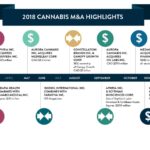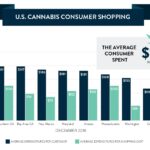CBD, Still A Restricted Substance

2018 Cannabis Mergers and Acquisitions Highlights
January 12, 2019
U.S. Cannabis Consumer Shopping
January 27, 2019CBD, Still A Restricted Substance By Jeffrey Finkle
On December 20th the 2019 Farm Bill was signed into law by President Trump, with overwhelming bipartisan support from both the House (386 to 47) and the Senate (87 to 3). This $867 billion bill will provide needed subsidies for American farmers, strengthens the food stamps (SNAP) program, and, most importantly for the cannabis industry, removes hemp from the Control Substances Act.
As many of you know, hemp and marijuana are both sub-species of the Cannabis sativa plant. Hemp, which has been bred for centuries to produce fiber for industrial purposes, is generally defined as having less than .03% THC, the chemical compound in this family of plants (referred to as cannabinoids) that has a psychoactive effect on users. Hemp is also rich in CBD, a cannabinoid thought to have significant medical and wellness benefits. Marijuana, on the other hand, has THC levels of between 15% to 40%.
It is questionable why hemp was ever deemed to be a controlled substance, and now that it has been eliminated from the Act, hemp production will be legal in 50 states for both industrial use and hemp-derived CBD. This will likely contribute significantly to the estimated ~ $2B overall CBD market in 2022.
Much has been written about CBD as an ingredient for food and drinks. You can buy CBD infused coffee at Kave in Bushwick Brooklyn, cocktails at Adriaen Block in Queens (try the Stoney Negroni!), and countless candies and snacks from national retailers like Walmart, Kroger, and CVS.
But with all this euphoria and impending freedom to consume, remember, CBD as a food and drug ingredient now falls under the FDA’s purview. The FDA has already come out strongly reminding people that cannabis, hemp, and cannabis/hemp-derived compounds will be subject to their regulation, the framework for which has yet to be put in place. From what I have read, CBD products will remain restricted until regulations are put in place.
From FDA Commissioner Dr. Scott Gottlieb:
“…it’s unlawful under the FD&C Act to introduce food containing added CBD or THC into interstate commerce, or to market CBD or THC products as, or in, dietary supplements, regardless of whether the substances are hemp-derived. This is because both CBD and THC are active ingredients in FDA-approved drugs and were the subject of substantial clinical investigations before they were marketed as foods or dietary supplements…”
This is a very important nuance in the market. I do not expect CBD products will be allowed to carry any claims, even those typically allowed for dietary supplements with the disclaimer “These claims have not been verified by the FDA…”, unless the FDA changes its current stance.
Here are a few articles that cover this topic:
- Marijuana Moment: FDA to Take Steps Toward Allowing CBD Products Following Hemp Legalization
- CNBC: FDA Weighs Legalizing Interstate Sales of Cannabis-Based CBD in Food and Drinks
- NBC News: New Agriculture Bill Legalizes Hemp. That Doesn’t Mean It’s Unregulated
About the Author

Named one of the “25 Angel Investors in New York You Need to Know” by AlleyWatch in 2014, Jeff has been a venture investor for ten years, an angel investor for eight years. Jeff is presently Co-founder of the Viridian Members Fund, the first member-managed fund in cannabis. He is also a Managing Member of Viridian Ventures and serves as Chairman of the Evaluation Committee and Treasurer of the ARC Angel Fund. Jeff has been actively advising startups at Reitler Advisory Group and publishes insights to his bog www.finkabout.it. He is a frequent panelist, speaker, and judge on venture investing and pitch competitions in NY. Jeff has also guest lectured and held office hours for many incubators/accelerators including Start-up Leadership Program, 37 Angels, NYU Polytech Incubator (New York City and Brooklyn), DreamIT Ventures, and FashInvest. Prior to his work with angel and seed groups, Jeff was a partner of Odeon Capital Partners, an early-stage venture capital fund. Prior to Odeon, Jeff was an operating executive at CA, Inc., and Cheyenne Software, Inc., where he served as GM of the Unix Division, VP of Corporate Development, VP of Corporate Marketing, and Director of Product Management. Jeff also serves as Chairman of the Board of Promoting Specialized Care and Health (PSCH), a not-for-profit offering residential, clinical, and day programs to 9,000 individuals with developmental, psychological, and behavioral disabilities in NYC’s five boroughs and Long Island.




